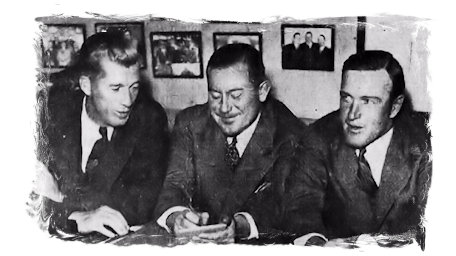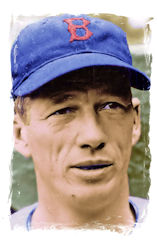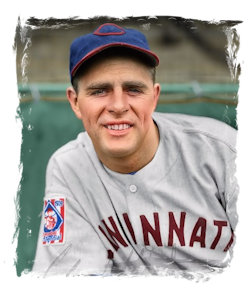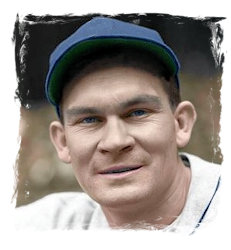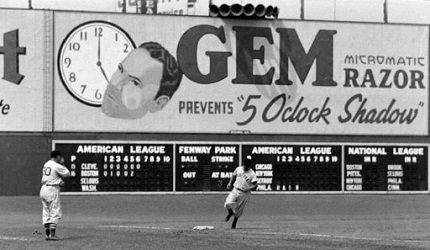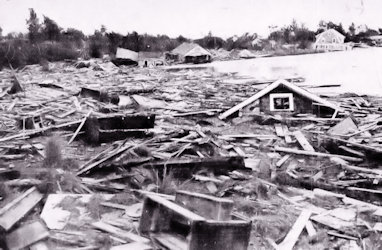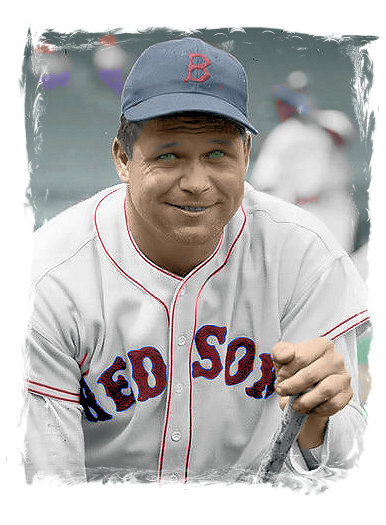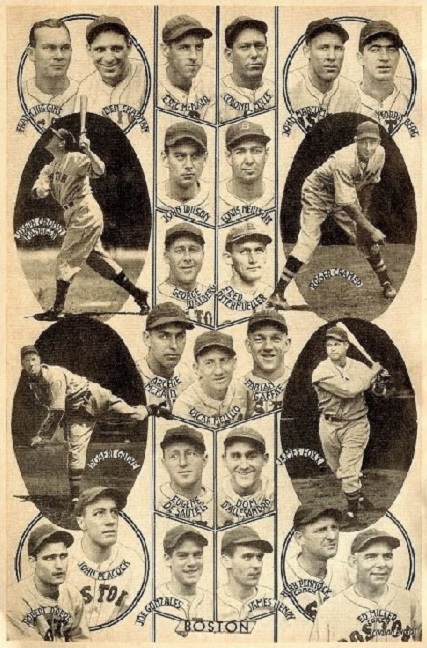|
With management looking for more power at the plate, on December 2nd, GM Eddie Collins traded Bobo Newsom, Buster Mills and Red Kress to the St. Louis Browns for the All-Star outfielder Joe Vosmik, who had batted .325 for the last place team. The outfield of Vosmik, Doc Cramer and Ben Chapman was widely believed to be the best Red Sox outfield since Duffy Lewis, Tris Speaker and Harry Hooper. Rookie outfielder, Ted Williams, who was 19 years old, had hit .291 with 23 home runs for the San Diego Padres of the Pacific Coast League, and was asked to report to spring training in Sarasota after he was officially signed to a contract. Ted arrived in camp and impressed everyone with his abilities, but his brashness and cockiness, along with a heavy dose of disrespect for the veterans, alienated him from everyone. Rookies were supposed to be seen and not heard, also receiving a good dose of hazing from the veterans. But Ted gave back as much as he took, cutting in front of others waiting their turn in the batting cage, and calling everyone "Sport". Bobby Doerr was just four months older, but was much more mature. He knew Ted from their days in southern California and felt his boasting and bluster was a result of Ted's insecurity. They were friends and he therefore spent a good deal of time explain Ted to the others, and pointing out that he meant no harm. Doerr was the most centered of men, straight and old-fashioned, not driven by ego. He was the "All American" boy. The camp stopped when it was Ted Williams turn in the batting cage and he did not disappoint at first. Reporters wrote stories proclaiming him the next Joe DiMaggio. But because of his disrespect, the veteran players went out of their way to make Ted look silly, and consequently on March 21st, he was sent down to the Minneapolis Millers, where it was hoped he would mature on the field and in the clubhouse. In Minneapolis, Ted drove everyone crazy also, but ended up winning the Triple Crown, hitting .366 with 43 homers and 142 RBIs. Had he kept his mouth shut and stayed with the Red Sox, he would have been one of the top players in the majors.
Without the young Ted Williams around, spring training quieted down and everyone went about their business. The 1938 season was the first year that pitcher Charlie Wagner took spring training with the Boston ballclub and he made the team. He didn’t get nearly enough work as most of baseball greatly favored veteran pitchers at the time. After sitting around more than he wanted, Wagner approached Joe Cronin and said, “I don’t want to sit here and watch these guys play. I’ve gotta pitch.” And so he was shipped him back to Minneapolis where he developed a lifelong friendship with Ted. For his efforts at Little Rock in 1937, Jim Tabor was invited to Red Sox spring training. He arrived late to camp and did not have much of an opportunity to show his skills. Once he arrived and started to play a little, he pushed Red Sox third baseman Mike Higgins into raising his game. Though Tabor had a good spring, it was clear he needed more experience. He made the team’s decision easier by breaking training rules. On April 1st he too was optioned to Minneapolis. With Bobby Doerr slated to take over second base and Joe Cronin at short, Eric McNair was the odd man out. After having a good year in spite of his personal tragedy, McNair grew frustrated and asked to be traded. The Sox tried to trade him unsuccessfully and so he was relegated to the bench. Most of the troublemakers were gone and camp went smoothly. The only one who got somewhat conentious was Ben Chapman, a hard-nosed four time all-star, who didn't like Joe Cronin telling him where to position himself. At one point he told Cronin just to worry about playing shortstop.
One other promising young player impressed everyone. His name was Jim Bagby who pitched in the New York-Pennsylvania League and was it's MVP. He had a great camp, hustled and had a great attitude, earning the spot as the Red Sox opening day pitcher against New York on April 18th. It was the first major league game he had ever seen. Overwhelmed, Bagby got off to a shaky start, but settled down, while the offense came from behind and beat the Yankees, with six runs in the sixth inning, 8 to 4. The next day was Patriots Day, and the Sox split a doubleheader with the Yankees, losing the morning game, but winning the afternoon game, 6-0. Jack Wilson started the game and held New York to one hit before having to leave the game with a pulled muscle. Fritz Ostermueller took up the reigns and further shut out the Yankees, only giving them one hit himself over six innings. Bobby Doerr's three run homer was all the offense the Sox needed. The Red Sox ended the opening series by also winning the finale, 3-2, thus taking three of their four games. Joe Vosmik drove in the two of the runs with a single and a triple. Ostermueller pitched an impressive 7-0 shutout in Washington on April 25th. He allowed them four scattered hits while banged out a pair of doubles and a single to lead the offense. On April 26th Gene Desautels had an inside-the-park blast to Griffith Stadium’s deep center field. Lefty Grove pitched a complete game at Yankee Stadium on April 28th, holding down the Yankees, 6 to 1. He allowed five hits and struck out five.
May started with the Sox at home for 13 games. It was very profitable as the Red Sox won ten of the contests. On May 2nd, the Sox pummeled the Philadelphia A's, 13 to 1. Gene Desautels was a perfect four-for-four, but Mike Higgins equaled a record for thirdbaseman with four boots. Doc Cramer's single in the 10th inning brought home Leo Nonnenkamp with the walk-off winning run, breaking a 3-3 tie on May 3rd. The 4 to 3 victory belonged to Lefty Grove who struck out six Tigers and passed the 2000 strikeout mark by striking out Roxie Lawson in the eighth inning. On May 5th, Ben Chapman got into a brawl with Tigers' catcher, Birdie Tebbetts. When Chapman questioned a couple of calls by home plate umpire, Joe Rue, Tebbetts began taunting him. It worked its way into a fist fight and both players were later fined and suspended. The largest baseball crowd ever at Fenway Park showed up to see Indians' young phenom, Bob Feller, pitch against the Sox on May 8th. Joe Cronin knocked out a homer and a double against the Indians, while Jack Wilson struck out twelve and beat Cleveland 5-0. That started a winning streak for the Sox. Jim Bagby allowed the Indians six hits the next game, while Cronin and Jimmie Foxx provided the punch in a 15-3 scalping of the Tribe on May 9th. Foxx banged out his sixth and seventh homers of the young season, driving home five runs. Foxx's first homer traveled 443 ft to the 12th row of the centerfield bleachers. Ben Chapman singled and tripled on May 11th, driving in two of the Red Sox four runs in a 4 to 2 victory over the White Sox. Lefty Grove made it five straight without a defeat. Jack Wilson tossed his second consecutive shutout when the first place Washington Nationals visited Fenway next. He beat Wes Ferrell and the Nats 10-0, registering 19 scoreless innings on May 13th. A double steal by Cronin and Foxx was followed by four successive hits that gave the Sox a 4-0 lead. Ben Chapman and Doc Cramer each had three singles. On May 14th the Sox beat Washington 10-9 in 11 innings and knocked them out of first place, taking that top spot by 1/2 game. Jimmie Foxx homered deep into the center field stands with two outs for the walk-off victory. Gene Desautels, Joe Vosmik and Joe Cronin also homered.
In the final game of the most interesting series at Fenway thus far, the Sox made it three straight wins from the Nats on May 16th. Lefty Grove upped his record to 6-0 in putting down the visitors 4 to 3. It was their eighth straight win and the American League standings showed the Sox on top by 1 1/2 games. Grove's seventh straight win came easy, as his teammates piles up 22 hits for 28 bases, in a 16-2 slaughter of the Browns in St. Louis on May 20th. Grove helped himself by smacking three solid singles. Ben Chapman went 4-for-5 and Joe Cronin had two doubles offensively. Jimmie Foxx belted his ninth home run, supporting Grove's eighth win without a defeat. The two-run blast broke a 3-3 tie in the seventh inning. But Grove had to hold off a ninth inning rally by the Tigers for his 5-4 win in Detroit on May 24th. Foxx then broke up a 3-3 deadlock in Cleveland with an eighth inning home run on May 26th. It gave the Sox and Jack Wilson an 8 to 4 win. Wilson set the Tribe down in order every inning except three, limiting them to five hits. He and Grove had accounted for 11 of the Sox' 19 wins. Through May 29th, Cronin was among the league leaders, batting .355, with more than half his hits being for extra bases. The Sox came to New York for a Memorial Day doubleheader on May 30th having lost seven of their last ten games. The Cleveland Indians were in first place, the Sox 2 1/2 games behind and the Yankees a game behind them in third place. 83,533 fans packed Yankee Stadium and another 6000 were turned away. The first game was supposed to be a great pitcher's battle between Lefty Grove (8-0) against Red Ruffing (6-1). But the Yankees knocked Grove around for five runs and sent him to the showers. In the fourth inning, with the Sox trailing 5-0, Archie McKain took over for Grove. His first two pitches were hit for singles by Bill Dickey and Myril Hoag. The next batter was Jake Powell and McKain threw a ball right at his head. The second pitch hit Powell in the stomach. Powell dusted himself off and headed toward McKain instead of going to first base. Cronin then ran over to defend his pitcher, got into a fight with Powell and both were thrown out of the game. But when both players headed to their locker rooms, Powell and some of his teammates waited for Cronin under the stands, where another fight started. Cronin was outnumbered, but got in his licks and earned the respect of his players from then on. Jake Powell was fined and suspended. Joe Cronin was bruised, but back at shortsop for the second game. The Yankees took both games, 10-0 and 5-4, and won again the next day. The Sox finished the road trip and the month of May, with a 19-16 record, in fourth place, five games out. However, Foxx hit 10 home runs and drove in a whopping 35 runs in May.
Back in Fenway, the Red Sox won 7 of the 11 games they played to start the month. Joe Cronin's home run with two men on helped Charlie Wagner win his first major league game on June 1st. Wagner and the Sox beat the Browns, 6 to 3. Jim Bagby got two hits and helped himself with his bat, in a game against the Browns the next day. On the mound he allowed six scattered hits, only three free passes and struck out the side in the seventh inning, winning 6 to 1. Jimmie Foxx propelled his 12th and 13th home runs against the Tigers on June 4th at Fenway. He helped Lefty Grove win his ninth game, 5 to 3. The Sox battled back from a 7-2 deficit in the seventh inning to score four runs, then another run in the eighth and finally won the game with a walk-off hit by Bobby Doerr in the bottom of the ninth. That added up to an 8 to 7 Red Sox win over the Tigers on June 6th at Fenway. Home runs number 16 and 17 were hit by Jimmie Foxx on June 8th against the Indians. The first was in the fourth inning off Bob Feller and the other was a three run shot that came in the seventh off Denny Galehouse. They were the prime factors in the Sox 7-6 decision at Fenway. Lefty Grove became the first hurler to win ten games in the majors on June 9th. He shut out the Indians 8-0 and was helped by Foxx's 18th homer. Grove batted in three runs himself. Ben Chapman also homered to go along with a triple and a double, while Bobby Doerr connected for a two-bagger three times. On June 10th, rookie Bill Lefebvre made his major league debut. Lefebvre came to the Sox right from the campus of Holy Cross, where Jack Barry, the former Sox shortstop, was his coach. He entered the game when the Sox were getting lobbered by the White Sox 13-1, as a pinch hitter in the eighth inning. Monty Stratton was on the mound and on the very first pitch thrown to him, Lefebvre hit a home run. The last day of the homestand saw the Sox split a doubleheader with the White Sox on June 12th. The largest crowd of the season thus far, 34,500 fans, saw a two-run eighth inning comeback in the first game, winning 3 to 2. Both games went down to the wire, with the White pulling up the nitecap in the top of the ninth. Two games out and in third place, the Sox went on the road and started out winning by 7-of-8, but then lost five straight. Lefty Grove needed some help in St. Louis on June 14th. He engaged with Bobo Newsom in a pitcher's duel for five innings. Up a run and with the tying run at third, Jack Wilson came in and got two batters to ground out, but the tying run scored. Then in the eight with the bases load, Johnny Peacock lined a single to left, putting the Sox up, 5-3. Wilson retired the Browns in the eighth and ninth to get the win. The next day, the Sox scored five runs in the last two innings, pulling out a 7 to 4 victory. Jimmie Foxx doubled and smacked his 19th homer. In the finale with the Browns on June 16th, Foxx was walked six times in succession, tying a major league record. He also established a new record for the most times a batter has faced pitcher in a game, without being credited with an at-bat. Joe Cronin had four hits in six trips, and Joe Vosmik was four for five, as the Sox swept the Browns with a 12-8 win. Jack Wilson won his fourth straight, limiting the White Sox to five hits in Chicago on June 17th, winning 5 to 1. The next day the Red Sox and White Sox battled for 12 innings. The game was finally decided when White Sox shortstop Boze Berger threw a grounder into the dugout, putting Gene Desautels on second base. Lefty Grove sacrificed him to third and he scored on Doc Cramer's fly to left, 4 to 3. Grove picked up his 11th win and the Red Sox were in only a game behind Cleveland Indians, the league leaders.
The Sox split a doubleheader the next day, June 19th, losing the first game 3 to 2, but winning the second game 11 to 6. Jimmie Foxx didn't hit a homer but was 4-for-4 in the afternoon game. However, all the eyes in the major league were trained back at Braves Field. There the Cincinnati Reds were playing the Boston Bees and Johnny Vander Meer was attempting to do the impossible. After hurling back-to-back no-hitters, he was attempting to make it three straight. 34,511 fans were in attendance and saw the Bees', Deb Garms line a clean single to center in the fourth inning. It broke Vander Meer's string of 21 2/3 consecutive no-hit innings. He went on to limit Boston to three more scattered singles, winning 14-1.
Finally, on June 21st, the Sox and Tigers split a doubleheader in Detroit. There Mike Higgins broke a record made by Tris Speaker in 1920. Higgins made 12 consecutive hits in 12 consecutive times at bat. Higgins had batted a sizzling .500, with 20 hits in his last 40 at-bats. The Sox had won 14 of their last 19 games and had crept to a game out of first, but then concluded the road trip by losing five straight and limped back to Fenway, 5 1/2 games behind the league-leading Indians. Jimmie Foxx hit his 22nd homer at Fenway on June 29th. And Mike Higgins launched a double to centerfield that chased home the two runners that gave the Sox a 6 to 4 win over Washington. Sixteen hits for a total of 27 bases and superb pitching by Jim Bagby spelled an 11-1 thumping of Washington to end the month. Foxx did not homer but singled, doubled and tripled. The Sox won 16 games and lost 10 in June and finished as they started, five games out of first.
Foxx's 23rd homer and 5 RBIs on July 1st, helped Lefty Grove win his 12th game in Philadelphia, 12 to 7. Down 5-3 the next day, the Sox rallied with three runs in the eighth inning to beat the A's 6 to 5. With the bases loaded, Doc Cramer drove in two runs to tie the game and Joe Vosmik's sac fly brought home the game winner. Independence Day was celebrated at Fenway Park with a doubleheader sweep of the Athletics, 8 to 5 and 5 to 2. Joe Vosmik and Gene Desautels with four hits apiece provided most of the offense. In Cincinnati, the National League Stars beat the American Leaguers 4 to 1, in the All Star Game on July 6th. Joe Cronin's error on a doubleplay ball that went between his legs in first inning, gave the NL Stars a 1-0 lead. Up 2-0, the NL scored two more runs in the seventh off Lefty Grove, when Jimmie Foxx, playing third base, overthrew a ball to first that allowed another run to score. Then Joe DiMaggio uncorked a wild throw after retrieving the bad throw, that allowed the fourth run to score. Doc Cramer started in left and was hitless in two times up. Cronin had a single and a double that scored Joe D. with the AL's only run in the 9th inning. The Sox returned from the break to host the Yankees and in their first matchup, on July 8th, the Sox barely held on to a 9-3 lead, but did and won 9 to 8. On July 10th, Lefty Grove was mowing down the Yankees when Ben Chapman lost the ball in the sun and a 2-1 lead became a 3-2 deficit. But Chapman redeemed himself leading the Sox comeback in the 7th inning, with a two-run double, winning 6 to 4. It earned Lefty his 13th win. Jimmie Foxx blasted a homer on July 14th against the Detroit Tigers. It cleared the left field screen by 20 ft and was the longest hit at Fenway this year. He had three hits as did Bobby Doerr in leading Lefty Grove to his 14th win with a 12-1 decision. In the first inning Grove fielded a grounder and threw off-balance to first base. After two batters in the fifth inning, he signaled to Joe Cronin to come to the mound. Grove had lost the feeling in his fingers and left the game. He was sent to the hospital where the doctors could not get a pulse in his left arm. The next day his arm was a little better. The doctors thought it was a circulation issue and so he was told to rest and not do anything with his arm for a least two weeks. Doerr belted a grandslam home run in the sixth inning against the Browns the next day. The Sox were behind 3-1 at the time, and went on to win 5 to 3. The Sox swept a doubleheader against the Browns, 11-5 and 14-4 on July 17th. Jimmie Foxx (25th & 26th) and Joe Vosmik each had two homers, including three doubles and a single by Foxx. Doc Cramer had five hits on the afternoon.
Emerson Dickman won his fifth straight game when he shut out the Cleveland
Indians, 4-0, in the first game of a July 25th doubleheader.
Dickman allowed
just three scattered hits, without letting a runner get past second base. That
was Earl Averill, who got the Tribe's first hit in the eighth inning, when
Joe Cronin lost his pop fly in the sun.
Foxx hit his 27th homer
in the sixth inning.
In St. Louis on July 30th, the game went into extra innings also. The Sox pulled out another rally in the 12th inning, with a 5 to 4 win. It was accomplished when Jimmie Foxx lined a double down the third base line and was brought home by Leo Nonnenkamp's single. The Sox finished the month, having gone 16-12, being swept in a doubleheader by the Browns on the 31st. Jimmie Foxx belted out his 29th homer, but he double loss however, pushed them 5 1/2 games behind the first place Yankees.
On August 1st, pitcher Joe Heving was purchased from Milwaukee and pitcher Bill Harris from Buffalo. Jim Tabor was recalled from Minneapolis. The Tigers enjoyed a five run lead when the Red Sox came to bat in the top of the ninth inning on August 5th. But the game was not over because the Sox scored five runs of their own to tie the game. Then in the 10th inning Doc Cramer and Joe Vosmik ripped off a pair of doubles to win the game 9 to 8. Joe Cronin drove home seven of the nine runs, with a single, a double and a homer. Lefty Grove had returned to the mound and pitched six innings, throwing 85 pitches. Cronin had three hits the next day as did Ben Chapman, who had two doubles. The Sox beat the Tigers again, 14-8. Philadelphia Athletics pitcher Nelson Potter had a perfect game going against the Red Sox into the seventh inning on August 9th. But then the Red Sox sent 11 batters to the plate and exploded for seven runs. Three more runs were scored in the eighth inning and six more in the ninth. When the dust settled the A's didn't know what happened, having lost 16 to 4. Newcomer Jim Tabor brought in five of the runs. Lefty Grove pitched two innings on August 11th in Philadelphia, left with a dead arm and threw his glove against the wall in the dugout. His season was over. Joe Cronin was hot with a hitting streak that lasted nine days. He went 19 for 46 for a .413 BA. At Fenway Park, Johnny Peacock doubled in the eighth inning of the first game of an August 17th doubleheader, and drove in Ben Chapman with the run that tied the game 3-3. Then Doc Cramer followed with a single that scored Peacock with the winning run, 4 to 3 on August 17th. Joe Heving made an impression his first month on the Red Sox, shutting out the A’s, 5-0, in the second game. The doubleheader sweep put a stop to the Red Sox six game losing streak. Home cooking must have helped, because upon their return to Boston, the Sox won 10 of their next 12 games. Rookie, Jim Bagby tossed his best game of the season on August 18th, shutting out the A's 2 to 0, allowing them only three hits. The Sox overcame a 3-0 lead to tie a game with Washington at Fenway on August 19th. Jimmie Foxx, who earlier started the Sox comeback with his 33rd homer, opened the 10th inning with a walk. After Joe Cronin bunted him over to second and Mike Higgins was intentionally walked, Ben Chapman popped up. But up came Bobby Doerr who then took a line drive toward the left field wall. Al Simmons took a chance by jumping toward it on the wall, but the ball bounced out of his glove and Foxx came in with the walk-off game winner, 4 to 3. OIn August 23rd the Sox and Indians engaged in a doubleheader, each battling for a hold on second place in the American League. It was a sweep for the Sox, winning by 13-3 and 14-12 scores. Doerr got three hits in six plate appearances. Cronin went 7-for-11, including two home runs. Higgins was also 7-for-11 with two doubles. And Foxx went 6-for-10, including a game winning three-run home run in the second game. driving home six runs. Two days later the Sox swept another dobleheader from the Chicago White Sox, 1-0 and 9-5. Jack Wilson a superb game in the opener shutting out Chicago allowing only five scattered hits. He also drove home the only run, to post his 13th win. The second game was an offensive battle. Offsetting White Sox, the BoSox belted out 16 hits of their own, including a five run sixth inning that wiped out a 3-2 Chicago lead. Doc Cramer's three run triple led the comeback. He had three hits including a double. In another doubleheader, the Red Sox were on the verge of a double loss on August 26th. Trounced 12-2 in the morning game, the Red Sox pulled off another patented thriller comeback in the nitecap. They had staked the White Sox to a 4-0 lead. Then Jimmie Foxx celebrated his 2000th hit when he took over with two home runs and a clutch double, to grab an 8-6 lead in the eighth inning. But the White Sox clawed their was back to an 8-8 tie that took the contest into overtime. Doc Cramer walked to open the 10th inning and was bunted over to second. Foxx received an intentional pass and Cronin flew out to Gee Walker. But after the catch he dropped the ball and Cramer sprinted over to third. It was settled when Mike Higgins slammed a line drive over Walker's head and Cramer trotted home with a 9-8 walk-off. August 27th was the Red Sox fifth doubleheader in six days, and it was another double sweep. The opener was a laugher as the Sox blasted Chicago 19 to 6. Johnny Peacock had four of the 22 hits in five times up, driving in five runs. Everybody the lineup had at least two his, including two doubles apiece by Doc Cramer and Fritz Ostermueller. Jimmie Foxx added his 38th homer of the season to top it off. The 19 runs was a season high for the Sox. The second game was the polar opposite, as the Red Sox could only score one run, while Bill Harris held Chicago run-less. The only run in the 1-0 win, happend in the eighth inning on a bunt and run executed by Harris with Ben Chapman charging home from second on his bunt. It was the third Sox doubleheader sweep over the past week. Jimmie Foxx was on a rampage. In the last eight games over five days, he was 19 for 36 (.527 BA) with five homers. August ended with a win over the Browns at Fenway. Bobby Doerr's fourth inning double chased home two runs that put the Sox ahead for good. Doerr had three hits in four times up. The Sox won 14 games and lost 15 for the month and held a two game lead over the Indians for second place, behind the Yankees, however by 14 games. Without a healthy Lefty Grove, who only appeared in two games and pitched just eight innings since mid-July, the Sox weren't competitive enough.
Joe Cronin had three hits including two doubles of Wes Ferrell, now pitching for New York, when the Sox faced the Yankees in New York on September 2nd. The Sox won 9-3, for their first win at Yankee Stadium all season. The Red Sox smashed 34 hits that resulted in 23 runs during a September 4th doubleheader in Philadelphia. But the most they could achieve was a split. Sloppy Sox pitching gave the A's a 12-11 win in the opener. The highlight was a grandslam homer by Ben Chapman. Then the Sox romped to a 12-2 victory in the closing game. Joe Vosmik had seven hits including two doubles in twelve at bats. On September 7th, the Sox returned home and "Joe Cronin Day" was held at Fenway Park. Jimmie Foxx helped celebrate by hitting two homers (41st and 42nd) and driving in eight runs (150 RBIs) in the 11-4 win against the Yankees. A 19-hit attack by the Sox against Philadelphia A's pitchers spelled a 12-7 win on September 11th. Twice in the first four innings, Sox pitching gave the lead away however. Joe Vosmik (4-for-5), Mike Higgins (3-for-4, HR) and Bobby Doerr (3-for-5) led the offense however. In Detroit the Sox hitters belted the Tigers for a 9 to 2 with 16 hits, win on September 14th. Joe Cronin had two doubles and a single, and Jimmie Foxx had three straight singles, driving in two runs.
Lefty Grove finally got into a game on September 21st, pitching the last two innings of an 8 to 4 win in St. Louis. Johnny Peacock had for hits and Jimmie Foxx belted his 47th home run. Meanwhile, back in New England, one of the most deadly hurricanes in recorded history barreled into the area. The category five hurricane, killed 600 people, and devasted the area with 120 mph winds and 25-35 waves on the coast. The Red Sox finished the season winning nine of their last eleven games. They fell into a pattern of beating everyone at Fenway Park where they were 52-23, and not doing much on the road. They failed to play .500 ball away from Fenway and wasted a league-best batting average of .299, but still finished in second place, with an 88-61 record, the best since their 1918 championship team.
Jimmie Foxx blasted a club record 50 home runs and a record 175 RBIs, winning the American League MVP. Only Hank Greenberg's 58 homers kept Foxx from winning the Triple Crown. Foxx's .349 BA and 398 total bases led the league. He batted .405 at home and hit 35 home runs. On the road he batted .295 and hit 15 home runs. Joe Cronin batted over .300 every month and ended the year with .323 BA. He had 17 home runs and 94 runs batted in. He led the league with 51 doubles, was the best fielding shortsop in the league and was voted onto the Sporting News All Star Team after the season ended. Bobby Doerr batted .289, with 80 RBIs, playing in 145 games. He led the league in sacrifice hits with 22. Defensively, he helped turn a league-leading 118 double plays. The highlight of Mike Higgins' season and career, was the 12 consecutive hits (along with two walks) he made between June 19th and 21st, breaking an AL record set by Cleveland’s Tris Speaker in 1920 and tying the major-league mark set by Johnny Kling of the Cubs in 1902. He drove in 106 runs. With a full season playing for the Red Sox, Ben Chapman hit .340, with 80 RBIs. The team scored a club record 902 runs. There wasn't an easy out in the lineup. Three Red Sox players led the league in hits - Joe Vosmik (201), Doc Cramer (198) and Jimmie Foxx (197). Vosmik hit .324, drove in 86 runs and scored 121. Catcher Gene Desautels had his best season, batting .291, driving in 48 runs and even hitting his first two major-league home runs. As a backup to Desautels, Johnny Peacock batted .303 in 195 at-bats and drove in 39 runs. It was an all college-grad catching corps, with Desautels (Holy Cross), Peacock, and Moe Berg (Princeton). Near the end of the year, Johnny hit the only home run of his major-league career: a bases-empty homer in Philadelphia on September 27th and drove in three runs during an 11-1 pasting. In 1937 Leo Nonnenkamp led the Southern Association in runs scored, with 145. He was the unanimous choice as the league’s Most Valuable Player. During spring training the New York Times noted that his “lighting speed brought a smile to Tom Yawkey” and a little power didn’t hurt, either – a home run he hit over Sebring’s right-field wall against the Newark Bears was said to be only the second to leave the ballpark over the 350-foot barrier. Nonnenkamp made the big-league club. He appeared in nine ballgames (eight as a pinch-hitter and one as a pinch-runner) before he finally got his first major-league hit. 1938 was the worst of Eric McNair's career. He tore ligaments in his left knee when he was filling in at short one day for Joe Cronin and only got into 46 games. He hit just .156, and was so unproductive that he drove in only seven runs. Perhaps feeling fate was conspiring against him, McNair considered just retiring from baseball. The Red Sox pitchers were equally as good as their hitters. The extra run support helped the pitching staff, but pitching was still the problem in 1938. No pitcher won more than 15 games, but they allowed just 751 runs, the second lowest in the league. Fritz Ostermueller returned to form with 13 wins against 5 losses. He started the season strongly. On Patriots Day, Ostey pitched six innings of one-hit ball in relief to beat the Yankees, 6-0. And six days later, he blanked the Senators, 7-0, on four hits. Lefty Grove was 7-0 at Fenway Park, but was 14-4 overall. His 3.08 ERA led the team, but his future was in question. Jack Wilson was willing and able to step up for any game that needed his help, and after a successful 1937 campaign he hoped to repeat in 1938. Unfortunately, his good fortune did not continue. On the way back north from spring training, he pulled a muscle in his leg. The injury hindered his efforts at the beginning of the season, though he still managed to pitch two shutouts in the first few weeks of the season. While he was able to pitch through the nagging injury to his leg, Wilson’s celebrated grit and determination came up against a more familiar challenge, the return of his sore arm.The pain in his elbow was so severe that Wilson was reportedly prepared to end his career. The Sox sent the young hurler to see Dr. Robert F. Hyland, the surgeon for both the St. Louis Browns and St. Louis Cardinals, who found no serious injury. The prescribed regimen for Jack was a healthy dose of rest for his arm but he received little, returning to his regular turn in the rotation before long. He was 15-15 with a 4.30 ERA. The year started out well in spring training, but Johnny Marcum's 5-6 record when the season started, sealed with fate with the Red Sox. Cronin became disenchanted and replaced him in the rotation. Suffering a sore arm, Marcum did not pitch after July 15th and on August 2nd he was traded to the Buffalo Bisons of the International League. Jim Bagby compiled a 15-11 record in 43 games, 25 as a starter. He had 10 complete games but achieved only one shutout that season, a tight 2-0 home win over the visiting Philadelphia Athletics on August 18th. His ERA stood at 4.21 with 73 strikeouts, but 90 walks. He surrendered 218 hits and 110 runs. It was a fairly decent start for what became a successful career. Joe Heving had success, starting 11 of the 16 games in which he appeared and finishing the last couple of months at 8-1 with a 3.73 ERA.
|
